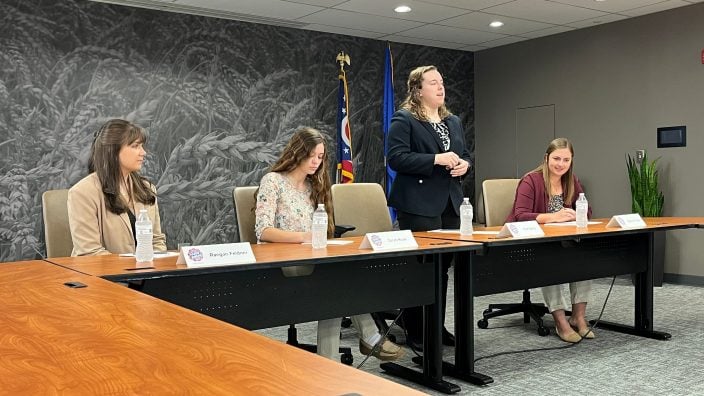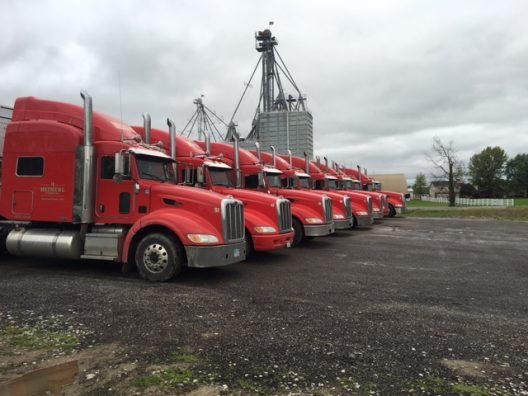Applications for Ohio Farm Bureau Health Plans now available
Members have three ways to apply: contacting a certified agent, calling 833-468-4280 or visiting ohiofarmbureauhealthplans.org.
Read MoreUPDATE: On March 23, President Trump signed into law the Consolidated Appropriations Act 2018 (omnibus bill). The bill addressed electronic logging devices and prohibits the enforcement of the ELD mandate on haulers transporting livestock and insects through the remainder of Fiscal Year 2018 (Sept. 30). A waiver for the hauling of all agricultural commodities from ELD requirements, remains in effect until June 18, 2018.
“The prohibition on enforcement will allow time for the agricultural community to continue their work with the Federal Motor Carrier Safety Administration to ensure our unique concerns can be addressed and all rules clarified,” said Leah Curtis, OFBF policy counsel.
ORIGINAL POST FEBRUARY 2018:
Ohio Farm Bureau’s Leah Curtis, policy counsel and senior director of member engagement, explains what electronic logging device requirements mean for those hauling agriculture products.
I heard there is a crackdown on trucks and trailers hauling livestock. Is this true?
There is no official “crackdown” or change in enforcement in relation to hauling by trucks and trailers of agricultural products. There has been no change in the law regarding Commercial Drivers’ License (CDL) requirements or the farm exemptions from certain federal trucking laws. However, the Federal Motor Carrier Safety Administration (FMCSA) did issue a new requirement, often called the “Electronic Logging Device (ELD) Mandate,” that would apply to some farm transportation that is subject to federal trucking regulation. However, that requirement is not in force at this time for most agriculture hauling.
What is the ELD mandate?
The FMCSA issued a rule, which went into effect in December, that requires all commercial drivers subject to the Hours of Service rules to log hours and on-duty time via an electronic logging device.
Does this mean there are new limitations on how far or how much you can drive?
No. The limitations on the hours a driver can be on duty or drive have not changed. Federal law limits the number of hours commercial drivers can be driving and on duty. A driver cannot:
If a farmer does not fit within these exemptions (likely traveling out of state and farther than the 150 miles), they must comply with the Hours of Service requirements.
Does the ELD requirement apply to farmers?
There are two possible answers here:
FMCSA found that there was not a significant safety risk in issuing a waiver specifically for this type of agricultural transportation. The waiver will allow for FMCSA to consider the unique challenges facing the agricultural industry in complying, and to consider further rulemaking consistent with those concerns. FMCSA has issued waivers from the ELD mandate for other types of drivers (outside of agriculture) as well.
Why was ELD a concern for farmers?
There are a number of reasons farmers are concerned about the ELD mandate:


Members have three ways to apply: contacting a certified agent, calling 833-468-4280 or visiting ohiofarmbureauhealthplans.org.
Read More

Collegiate Farm Bureau serves as a connection to current industry professionals and equips the next generation with the essential tools and resources needed to excel in their careers.
Read More

Ohio Farm Bureau members met one-on-one with state legislators and staff to discuss policy priorities impacting Ohio’s farms and rural communities.
Read More

Legacy nutrient deductions enable new farmland owners to claim deductions on the nutrients within the soil on which healthy crops depend.
Read More

Farmers, agribusinesses and community members are encouraged to nominate their local fire departments for Nationwide’s Nominate Your Fire Department Contest through April 30.
Read More

Introduced by Sen. Paula Hicks-Hudson, SB 120 would establish the Urban Farmer Youth Initiative Pilot Program.
Read More

Gases, vapors, and fumes can all create risk. How can we measure and protect ourselves from them?
Read More

The Ohio Farm Bureau’s Young Agricultural Professionals State Committee has named its 2026 leadership and the individuals who will be serving on the state committee for 2026-2028.
Read More

The Ohio Farm Bureau Foundation has multiple scholarships available to Ohio students from rural, suburban and urban communities who are pursuing degrees with a connection to the agricultural industry.
Read More

With 100% bonus depreciation now permanent, farmers can deduct the full cost of a new agricultural building in the year it’s placed in service.
Read More